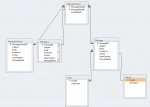Hi all
Being new to databases, I feel I'm jumping in the deep end here, but here we go:
I need (yes, need) to create a database that allows:
The tutorial doesn't really explain the relationships, just the tables required, so what I've made is probably a million miles away, in which case direction on the format would be very much appreciated!
Thanks in advance.
Being new to databases, I feel I'm jumping in the deep end here, but here we go:
I need (yes, need) to create a database that allows:
- Messages to be submitted to from a user to another user (each user will have their employee number loaded in already as their 'UserID' in the 'Users' table (attached)
- The recipient of a message should be able to reply to the original message and these messages be extracted easily.
- After a pre-determined amount of time, messages from the 'Message' table should be transferred to the 'MessageArchive' table.
The tutorial doesn't really explain the relationships, just the tables required, so what I've made is probably a million miles away, in which case direction on the format would be very much appreciated!
Thanks in advance.
Attachments
Last edited:

